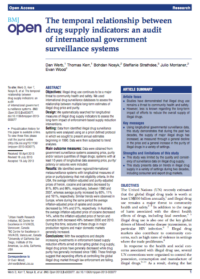Posted: September 30 2013
Author: CDPE
New Research Shows War on Drugs Has Failed to Reduce Supply and Access to Illegal Drugs Internationally
Regional press releases for North America, Latin America & Europe are also available.
A new study published in the British Medical Journal Open finds that the prices of illegal drugs have generally declined while their purity has increased over the past twenty years, raising questions about the effectiveness of international law enforcement efforts to reduce drug supply. Researchers from the International Centre for Science in Drug Policy reviewed two decades of global drug surveillance data, finding that the supply of major illegal drugs has increased, as measured through a decline in the price, while there has been a corresponding general increase in the purity of illegal drugs.
“These findings add to the growing body of evidence that the war on drugs has failed,” said study co-author Dr. Evan Wood, Scientific Chair of the International Centre for Science in Drug Policy and Canada Research Chair in Inner City Medicine at the University of British Columbia. “We should look to implement policies that place community health and safety at the forefront of our efforts, and consider drug use a public health issue rather than a criminal justice issue. With the recognition that efforts to reduce drug supply are unlikely to be successful, there is a clear need to scale up addiction treatment and other strategies that can effectively reduce drug-related harm.”
Researchers reviewed indicators of drug supply in consumer markets such as Europe, the United States, and Australia, and drug seizures in drug-producing regions such as Latin America, Afghanistan, and Southeast Asia. Data were derived from government surveillance systems. The study found that:
- With the exception of powder cocaine, the purity and/or potency of illegal drugs in the U.S. generally increased during the study period;
- The price of illegal drugs, with few exceptions, generally decreased globally; and,
- Seizures of cannabis, cocaine, and opiates generally increased in major drug production regions and major domestic markets.
Reactions from the international community:
“In response to a study like this, policymakers often say ‘drugs are harmful so they must be kept illegal’. What they fail to consider is, as this and other research suggests, that drugs are more harmful – to society, individuals, and the taxpayer – precisely because they are illegal. Some European countries have taken steps to decriminalize various drugs, and these types of policies should be explored in Latin and North America as well.”
– Fernando Henrique Cardoso, former President of Brazil and Chair of the Global Commission on Drug Policy (Brazil)
“This research should serve as a wake-up call to policymakers to legally regulate drugs as an urgent priority. It’s way past the time for our political leaders in Europe to explore effective alternatives to the war on drugs, which has been proved a catastrophic failure. Billions of dollars and millions of lives are at stake if they fail to act.”
– Danny Kushlick, Head of External Affairs, Transform Drug Policy Foundation (United Kingdom)
“The drug policies of countries like Uruguay, the Netherlands and Portugal are clear examples of thoughtful, effective government responses to the problems posed by illicit drug use. The health and social problems associated with illicit drugs are exacerbated by enforcement-based approaches, and researchers and policymakers need to work together to develop and implement policies that will actually improve public health and safety.”
– Prof. David Nutt, Chair, Independent Scientific Committee on Drugs (United Kingdom)
“The punitive prohibitionist approach to global drug control has proven remarkably costly, ineffective and counter-productive. It has generated extraordinary levels of violence, crime and corruption while failing entirely to reduce the availability and use of psychoactive drugs. Fortunately a growing number of governments now recognize that drug policies grounded in science, health and human rights can produce better results, at lower cost, than persisting with futile prohibitionist efforts.”
– Ethan Nadelmann, Director, Drug Policy Alliance (United States)
